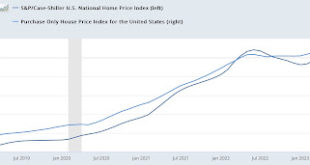from Lars Syll Little in the discipline has changed in the wake of the crisis. Mirowski thinks that this is at least in part a result of the impotence of the loyal opposition — those economists such as Joseph Stiglitz or Paul Krugman who attempt to oppose the more viciously neoliberal articulations of economic theory from within the camp of neoclassical economics. Though Krugman and Stiglitz have attacked concepts like the efficient markets hypothesis … Mirowski argues that their attempt...
Read More »Pew quits the generation game
Since the beginning of this millennium, I’ve been writing critiques of the “generation game”, the idea that people can be divided into well-defined groups (Boomers, Millennials and so on), with specific characteristics based on their year of birth. As I said in my first go at this issue, back in 2000 (reproduced here ) Much of what passes for discussion about the merits or otherwise of particular generations is little more than a repetition of unchanging formulas about different...
Read More »In Thrall to the Infallible Hand
from Duncan Austin While Adam Smith’s Invisible Hand has many beneficial attributes, somewhere along the way the Invisible Hand was recast as the Infallible Hand, seeding today’s widespread faith that markets can solve large-scale social and ecological problems they are ill matched for. In the formidable shadow of the Infallible Hand, non-market solutions – policy, regulatory, cultural, behavioural – are often deemed ‘impractical’, so remain under-utilized. ‘Green growth’, ‘sustainable...
Read More »Open Thread June 4, 2023
Tax Deal Open Thread Theater, Angry Bear, angry bear blog Open Threads can be done weekly if needed. Don’t clutter up posts. I am not the cleaning lady for off topic comments. Every Star Trek Ship For Captain Data After Picard Season 3, screenrant.com. Intriguing series or movie. Data as a Star Ship captain. Especially now with the advent of AI computer beings. ...
Read More »The Evolution of Working Hours: From the 8-Hour Day to the Four-Day Week
I wrote this piece for the Committee for the Economic Development of Australia following a presentation I gave along with other researchers and members of Four Day Week Global. (Video here). A version was published by Independent Australia, under the title A long weekend every week? It’s time. More than 150 years ago, workers in New Zealand, closely followed by Australia, were the first in the world to secure an eight-hour working day. And 75 years ago, we achieved that great boon,...
Read More »Irrational Exuberance — Robert Shiller’s modern classic
Lars Syll At the beginning of the year 2000, a book titled Irrational Exuberance was published. The American economics professor and Nobel laureate Robert Shiller warned that the extensive deregulation in the financial market that had taken place since the Thatcher-Reagan era had led to a rapid credit expansion. Banks and financial institutions saw a skyrocketing increase in lending, and the pursuit of gaining larger market shares led to neglecting creditworthiness checks and accepting...
Read More »Labor shuffles to centre-right as three-party system waltzes in
My latest piece in Crikey Prime Minister Anthony Albanese (Image: AAP/Mick Tsikas)A year after the Albanese government’s election win, Labor’s strategy for its first term in office is clear. On the issues where the Coalition has historically had an advantage, most notably economics, defence and foreign policy, Labor has adopted those policies and sought (so far successfully) to more competently implement them. On everything else — climate, health, education, human rights — Labor...
Read More »The Religion of Economics
from Asad Zaman Maeshiro (2016) in “The Capitalist Religion and the Production of Idols“, writes that Capital is the God, and Capitalism is the religion of modern society. Gauthier’s review of Nelson’s Economics As Religion states that “economics became the modern theology that replaced traditional theology as the set of doctrines that give meaning to our social reality and hope to our endeavors to improving our lives … (Nelson analyses) the works of the major twentieth century American...
Read More »House prices may have bottomed, YoY price increases (leading inflation) have declined
House prices may have bottomed, while YoY price increases (leading inflation) have declined to lower than their 25-year average – by New Deal democrat Seasonally adjusted house prices through March as measured by both the FHFA (light blue in the graphs below) and Case Shiller (dark blue) Indexes rose, the former by 0.7% and the latter by 0.2%. This is the second straight increase in a row, and suggests that house prices may have bottomed:...
Read More »Economic methodology — Lawson, Mäki, and Syll
from Lars Syll We are all realists and we all — Mäki, Cartwright, and I — self-consciously present ourselves as such. The most obvious research-guiding commonality, perhaps, is that we do all look at the ontological presuppositions of economics or economists. Where we part company, I believe, is that I want to go much further. I guess I would see their work as primarily analytical and my own as more critically constructive or dialectical. My goal is less the clarification of what...
Read More » Heterodox
Heterodox






